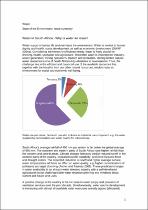JavaScript is disabled for your browser. Some features of this site may not work without it.
- ResearchSpace
- →
- Research Publications/Outputs
- →
- Conference Publications
- →
- View Item
| dc.contributor.author |
Strydom, W

|
|
| dc.contributor.author |
Hill, Liesl

|
|
| dc.contributor.author |
Hobbs, P

|
|
| dc.date.accessioned | 2010-08-27T08:04:36Z | |
| dc.date.available | 2010-08-27T08:04:36Z | |
| dc.date.issued | 2010-03 | |
| dc.identifier.citation | Strydom, W, Hill, L and Hobbs, P. 2010. Water. State of the environment: Issue summary. CSIR, pp 15 | en |
| dc.identifier.uri | http://hdl.handle.net/10204/4220 | |
| dc.description | Copyright: 2010 CSIR | en |
| dc.description.abstract | The shortfalls in water available per water management area and between river systems are alleviated through the transfer of significant volumes of water. This has a direct negative impact on the ecology of these systems, with in many cases, the ecological reserve not being met. The ecological water requirements should also be determined and implemented for all estuaries. The biggest challenge to protecting water resources, including estuaries, is the fragmentation of the managing responsibilities amongst the different national, provincial and local government agencies – some lacking in capacity and resources. The solution to the water deficit in many water management areas is not necessarily more dams and more transfer schemes, but the improvement of water conservation and water re-use activities, as well as water demand management. Groundwater is an important water resource in rural and arid areas. The understanding of the factors that impact on the sustainable utilisation of groundwater needs to improve. South Africa’s fresh water quality is rapidly declining due to increased pollution caused by industrial development, urbanisation, afforestation, mining, agriculture and power generation. The development of management plans should take cognisance of both socio-economic good (job creation, economic growth) and environmental sustainability (biodiversity conservation, ecosystem health). | en |
| dc.language.iso | en | en |
| dc.publisher | CSIR | en |
| dc.subject | Water management | en |
| dc.subject | River systems | en |
| dc.subject | Groundwater | en |
| dc.subject | Ecological reserves | en |
| dc.subject | Environmental sustainability | en |
| dc.subject | Biodiversity conservation | en |
| dc.subject | Ecosystem health | en |
| dc.subject | Aquatic ecosystems | en |
| dc.title | Water. State of the environment: Issue summary | en |
| dc.type | Conference Presentation | en |
| dc.identifier.apacitation | Strydom, W., Hill, L., & Hobbs, P. (2010). Water. State of the environment: Issue summary. CSIR. http://hdl.handle.net/10204/4220 | en_ZA |
| dc.identifier.chicagocitation | Strydom, W, Liesl Hill, and P Hobbs. "Water. State of the environment: Issue summary." (2010): http://hdl.handle.net/10204/4220 | en_ZA |
| dc.identifier.vancouvercitation | Strydom W, Hill L, Hobbs P, Water. State of the environment: Issue summary; CSIR; 2010. http://hdl.handle.net/10204/4220 . | en_ZA |
| dc.identifier.ris | TY - Conference Presentation AU - Strydom, W AU - Hill, Liesl AU - Hobbs, P AB - The shortfalls in water available per water management area and between river systems are alleviated through the transfer of significant volumes of water. This has a direct negative impact on the ecology of these systems, with in many cases, the ecological reserve not being met. The ecological water requirements should also be determined and implemented for all estuaries. The biggest challenge to protecting water resources, including estuaries, is the fragmentation of the managing responsibilities amongst the different national, provincial and local government agencies – some lacking in capacity and resources. The solution to the water deficit in many water management areas is not necessarily more dams and more transfer schemes, but the improvement of water conservation and water re-use activities, as well as water demand management. Groundwater is an important water resource in rural and arid areas. The understanding of the factors that impact on the sustainable utilisation of groundwater needs to improve. South Africa’s fresh water quality is rapidly declining due to increased pollution caused by industrial development, urbanisation, afforestation, mining, agriculture and power generation. The development of management plans should take cognisance of both socio-economic good (job creation, economic growth) and environmental sustainability (biodiversity conservation, ecosystem health). DA - 2010-03 DB - ResearchSpace DP - CSIR KW - Water management KW - River systems KW - Groundwater KW - Ecological reserves KW - Environmental sustainability KW - Biodiversity conservation KW - Ecosystem health KW - Aquatic ecosystems LK - https://researchspace.csir.co.za PY - 2010 T1 - Water. State of the environment: Issue summary TI - Water. State of the environment: Issue summary UR - http://hdl.handle.net/10204/4220 ER - | en_ZA |






